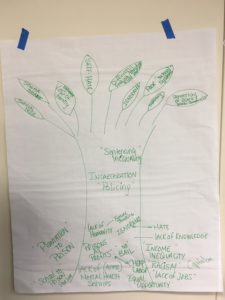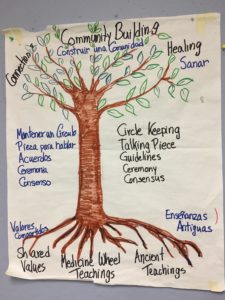After years of agitation and calls for change by affected communities, there are a robust number of initiatives on the local and national level to disrupt the school-to-prison pipeline. Although rates of suspensions are declining across the city, suspensions are still disproportionately distributed in the Bronx. Black students and students with disabilities are the most impacted. As a program that works closely with Bronx schools and students, we are closely following the lessons learned.

Restorative justice is one approach being implemented by schools. According to the Centre for Justice & Reconciliation, “Restorative justice repairs the harm caused by crime. When victims, offenders and community members meet to decide how to do that, the results can be transformational.” New Settlement’s Parent Action Committee (PAC) led a School Safety Campaign for several years that fought to “reduce suspensions, arrests, and court summonses in Bronx public schools by advocating for positive school climate, increased social and emotional supports for young people, and restorative discipline.” They trained School Safety Agents, teachers, and families on restorative discipline practices, which include skills to de-escalate and mediate conflict.
Our partner school P.S. 42 was recently recognized for its restorative justice work with the Positive Learning Collaborative. The UFT visits the school for a recent podcast, On the Record with Michael Mulgrew – Episode 10: Beyond Suspensions: Changing School Culture, One School’s Journey. They discuss how the school-wide approach engages students, teachers, and parents. PS 42 institutes community circles, a technique that can address conflict but also socio-emotional growth overall, which extends to food and health. Recently, the school had a collective visioning conversation about their new garden space in each classroom’s community circle.

At Community Food Action, we aim to practice conflict mediation and discipline through a restorative lens. Last year we partnered with the Bronx organization DREAM! to use these practices with our Youth Leaders. One youth shared that she appreciated the process because it helped her understand what could be done differently in the future. In her school, students are punished but do not get a chance to make it right. As we work towards our vision of a food movement that is anti-racist and responsive to marginalized communities, we are grateful for our partners and allies who are leading the way in the movement for educational justice.